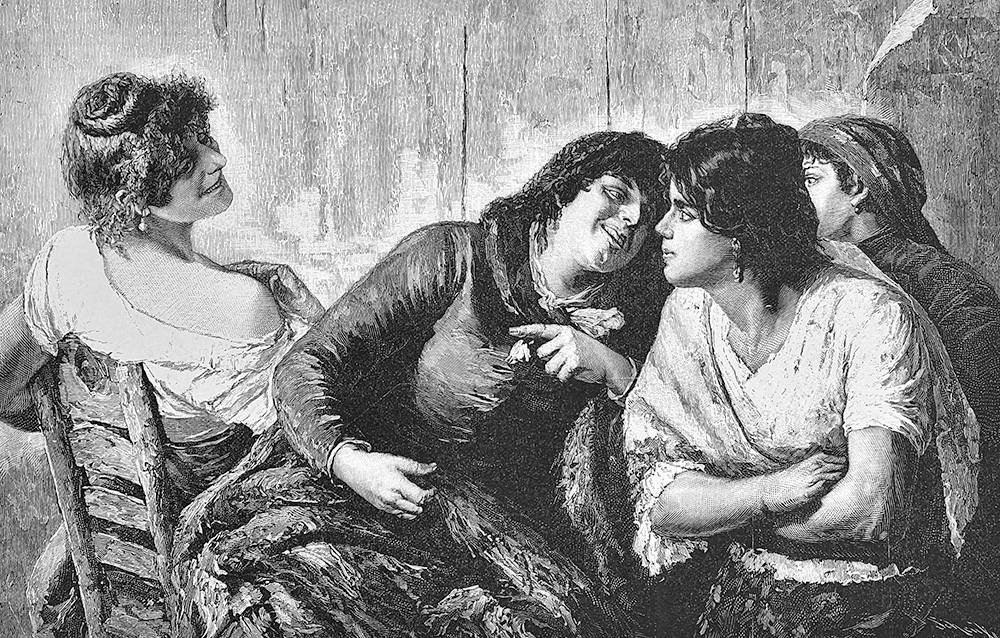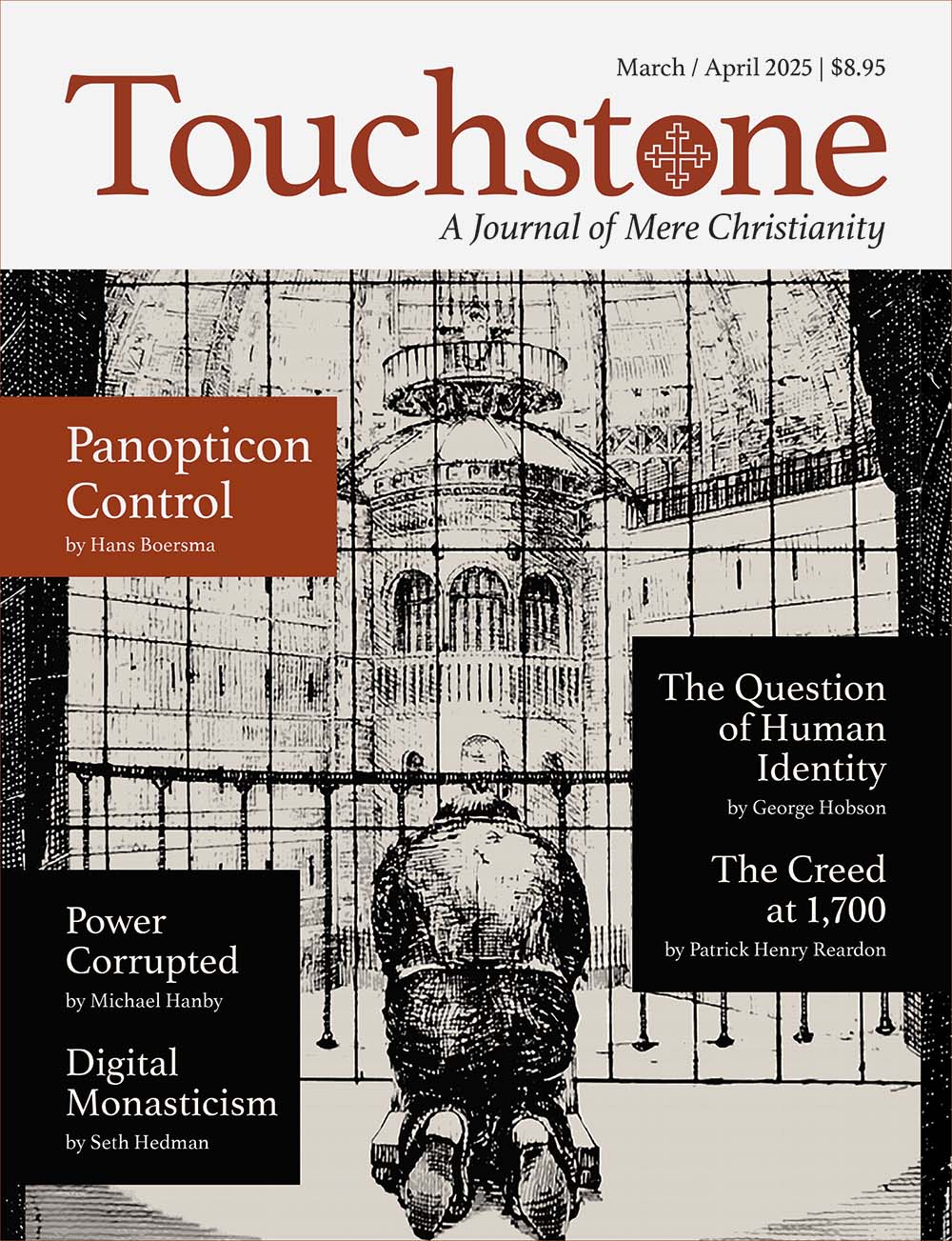Vicious Talk
For reasons of business, I’ve been a presence on what is called “social media,” whose name shows that though the devils know no mirth, they yet have a knack for irony. Along one particularly well-trodden road, I have found that post after post, in a dreary invariability, is devoted to interpreting someone’s words and deeds in the worst conceivable light, and that doesn’t even get to outright calumny, when words are put in someone’s mouth who never said them, or someone is blamed for doing what he never did.
It is a lot easier to tear down than to build up, and that goes for reputations also. It does not require a sharp mind to be flippant, another form of the mirthless humor of hell; and I imagine that the only reason why Uncle Screwtape might not pepper his messages to Wormwood with “LOL” is that the old sinner would have better literary taste than most of our commentators, and that though he has fooled himself to the core, he would not like to appear a fool to others.
In any case, as you make your way down the antisocial page, it is all hatred, spite, hypocrisy, one Pharisee after another saying to all the world and even to God, “I am so thankful that I am not like those others.” Often, among priests and those who consider themselves devout, the hypocrisy takes the form of a most virulent Pharisaism in reverse: “I thank you, Lord, that I am not like that Pharisee over there, who scrupulously tries to obey all of your laws, while I trust in your mercy and break them left and right.” That is what is called believing in a gospel of “love” as specifically opposed to a religion of “rules,” a gospel preached most loudly by those who neither love nor obey.
Political strife, from which there is no longer any escape, is much to blame. Mrs. Schuyler van Rensselaer, writing in 1894 against women’s suffrage, suggested that it was a healthy thing for a society to have half of its rational population not wound up to a fever pitch over politics, to sustain the more important human relations in spite of political heat, and to preserve the small but soothing courtesies of ordinary life. From what I regularly see, it is hard for me to escape the conclusion that the more social sex, in its most politically engaged members, is now the more intransigent in political enmity and the more likely to cry out with horror should anyone call their opinions into question, opinions they tend to hold with the vehemence of Tertullian but without the man’s sharp wit and logic. But that is only a general impression, and in this regard as in others, the force of a mob drags everyone down, male and female, and people are far worse online than they would ever be in person.
That most of the spitefulness is aimed by the left against the right is no comfort for the conservative, because quite enough of it goes the other way, and the general effect is the same. It will do you no spiritual good, and it is unlikely to achieve even a worldly purpose, to be pleased to find that your opponent, who may be to blame for falsehood or cowardice or outright wickedness, has justified your low opinion, and to make that pleasure evident to everyone. It is not a love of truth. It is a love of falsehood in others. One sign of it is the disappointment you feel when you learn that someone is innocent of the sin you had attributed to him.
Manzoni’s Reflection
So I thought I should write an essay on detraction, when by chance I came upon a meditation by Alessandro Manzoni (1785–1873), the author of I Promessi Sposi (The Betrothed), generally considered to be the greatest novel in Italian. Manzoni came to his Catholic faith only in his young adulthood, after he had gotten married; his mother had brought him up in the high-class atheistic salons of post-revolutionary France. In that nation, at that time, speaking evil of others had become the blood of politics, issuing forth in blood on the streets; and yet the young Manzoni, living in the aftermath of the Reign of Terror, an admirer and a critic of Napoleon, somehow acquired a judicious habit of psychological analysis, probing the tangled and often hidden motives that cause us to do what we do. When it comes to that, Manzoni must be ranked with the greatest of authors—not with the flashy Voltaire, but with Homer, Shakespeare, and Dostoevsky.
Nothing I can write on this subject can be as powerful as what Manzoni did write, and so I have translated his meditation from the Italian, in the hope that our readers may profit by what a man of profound Christian faith and long meditation upon human nature has to say. The passage is from Osservazioni sulla morale cattolica (1819), Observations on Catholic Moral Teaching.
Love of truth, and the desire to draw a just distinction between virtue and vice—are these really the principal and common motives for speaking ill about our neighbor? And the ordinary effect, is it really to make the truth shine forth clearly, to set virtue in honor, and vice in abomination?
A mere glance at society will convince us straightaway of the reverse. It will show us the true motives, the true features, and the common effects of speaking ill.
For when men fall into idle conversation, and the vanity of each person, who wants everybody to pay attention to him, finds an obstacle in the vanity of every other person who aims at the same end; and when they thus struggle by stealth and sometimes by open force to seize that attention they so rarely wish to give; why is it then so easy for a man to gain what he wants by announcing, in his first words, that he is going to speak ill of his neighbor? Why—unless it promises some miserable relief to so many of our passions?
And what passions! There is pride, that silently prompts us to build up our own superiority on the abasement of others, that consoles us for our failings with the thought that other people have the same or worse. What a wretched way to err! Craving perfection, a man neglects the help religion offers for advancing toward what is absolutely perfect, the perfection for which he was created, and instead he busies himself with a comparative perfection; he longs not to be best, but to be first; he wants to compare, not to become. There is envy, inseparable from pride, envy that rejoices in the bad as charity rejoices in the good, envy that breathes more freely when a fine reputation is tarred, when it can be shown that there is one virtue or one talent the fewer. There is hatred, that makes us so ready to believe the worst; there is self-interest, that makes us hate rivals of every kind.
These and suchlike are the passions that make it so common a thing to speak evil and to listen to it; the passions that in part explain the ugly delight a man feels in laughing at someone or condemning him; that show that as shallow and slovenly as our reasoning is when it comes to proving the bad, so severe will our tribunal be before we will believe either in a good deed or in a just and pure intention to perform a good deed. It is no wonder that religion can make nothing out of these passions and what they set in operation. For how can such crumbly stuff, incapable of any real connection, be built into that edifice of love and humility, of worship and of right reason, that she wishes to erect in the hearts of all men?
There is in evil speech a form of cowardice that makes it akin to a secret denunciation, and this, too, sets in high relief its opposition to the spirit of the gospel, which is all frankness and honesty, which detests all covert ways for hurting other people without exposing oneself, and which, in the disagreements that we must in any case have when we are defending what is right, commands above all a conduct that requires courage. Most of the time, when you censure an absent person, you do it at no risk; the blows strike at someone who cannot defend himself; and it is often a way, as base as it is sly, to flatter those who are listening. “Speak no evil of a deaf man,” is one of the pious and profound prescriptions of the Mosaic law (Lev. 19:14), and Catholic moralists have applied it also to one who is absent. In so doing, they show they have entered into the true spirit of a religion that demands that whenever one is compelled to stand in opposition, he must do so while keeping charity, and avoiding any mean discourtesy.
Many people say that ill-speaking is a kind of censure that helps to hold men to their duties. Really, now: a tribunal made up of judges with a personal stake against the accused, when the accused will be neither confronted nor heard out, when whoever would take up his defense will likely be discouraged or sneered at, when you can expect that all the proofs of the charge will be set forth very nicely; a tribunal like that should easily diminish the number of offenses! Rather, it is easy to see that people credit condemnations that, if they had any stake in examining their worth, would not suffice even to produce a slight probability of truth.
Ill-speaking renders both the speaker and the listener the worse, and usually also the person who is its object. When it strikes an innocent person (and as numerous as human failings are, unjust accusation is one of the worst), what a great temptation it is for him! Maybe, straining up the steep path of an honest life, he has set himself the goal of winning the approval of men, full of that opinion as common as it is false, that virtue is always recognized and appreciated; and then he sees that it is not recognized for what it is, so he begins to believe that it is an empty word; his soul, nourished by cheerful and easygoing ideas of applause and accord, begins to taste the bitterness of hatred; and then the shaky foundation upon which he had built his virtue gives way. Happy would he be, if instead it made him think that the praise of men is no sure reward, nor any reward at all!
Ah, if mistrust reigns among men, the ease with which we speak ill is one of the prime causes. He who has seen one man shake another’s hand, with a smile of friendship on his lips, and then has heard him tear the other apart behind his back—how can he help suspecting that every expression of esteem and affection conceals a trap? But trust would grow, and good will and peace along with it, if detraction were forbidden; then everyone who embraced a fellow man could be sure of not being the object of his censure and ridicule, and the embrace would be more natural, with a purer and freer sense of charity.
Many people believe it is inexperience or naivete that makes someone unwilling to suppose evil—as if it needed great acuity to suppose that every man in every case will choose the most miserable part. But the reverse is true. The disposition to judge with indulgence, to weigh each one of a storm of accusations, and to feel sympathy for genuine faults, requires a habit of reflecting on that most intricate web of motives that determine our action, and on human nature and its frailty.
The man who is made aware of the whispers against him (and talebearers are the natural offspring of those who speak ill) will often experience an injustice only he can know, but whose danger everyone can and therefore should recognize. He has acted in circumstances whose full interrelations he alone comprehends; but the critic does not bear that burden; he has judged only a bare fact, by rules whose application he can have no just measure of; perhaps he blames the man only for not doing what he himself would have done, maybe because the man does not share his passions.
And even when the censured man is forced to admit that the ill-speaking had nothing of slander about it, that does not usually move him to reconsideration. It usually moves him to scorn. He does not think of reforming. He turns to examine the conduct of his detractor, to search for a weak spot, open to recrimination. Impartiality is rare enough in everyone; rarer still in one who has been offended. And that is how the wretched war begins, one continual business of hunting down and exposing the defects of other people, as we grow more and more careless of our own.
And when the interests of two people are plainly opposed, what wonder is it that anger and blows are quick to follow, and that we injure one another so badly? To have thought and thought about some matter and to have spoken about it, too, sets us up for that strife. We are already accustomed in our conversation not to pardon, but to delight in seeing someone put down, to tear at people with whom we have no quarrel at all; we treat as enemies people we do not know.
Then how can we find ourselves all at once disposed to charity and consideration, just when a controversy is most difficult and requires a soul long exercised in those virtues? That is why the Church, who wills that we be brothers, wills also that men not think evil, that they groan when they do see it, and that they speak of those who are not present with that delicacy which self-love itself causes us to use with those who are. To govern your actions, keep a tight rein on your words, and to govern those, set a watch upon your heart.
Anthony Esolen is Distinguished Professor of Humanities at Thales College and the author of over 30 books, including Real Music: A Guide to the Timeless Hymns of the Church (Tan, with a CD), Out of the Ashes: Rebuilding American Culture (Regnery), and The Hundredfold: Songs for the Lord (Ignatius). He has also translated Dante’s Divine Comedy (Random House) and, with his wife Debra, publishes the web magazine Word and Song (anthonyesolen.substack.com). He is a senior editor of Touchstone.
subscription options
Order
Print/Online Subscription

Get six issues (one year) of Touchstone PLUS full online access including pdf downloads for only $39.95. That's only $3.34 per month!
Order
Online Only
Subscription

Get a one-year full-access subscription to the Touchstone online archives for only $19.95. That's only $1.66 per month!
bulk subscriptions
Order Touchstone subscriptions in bulk and save $10 per sub! Each subscription includes 6 issues of Touchstone plus full online access to touchstonemag.com—including archives, videos, and pdf downloads of recent issues for only $29.95 each! Great for churches or study groups.
Transactions will be processed on a secure server.
more on culture from the online archives
more from the online archives
calling all readers
Please Donate
"There are magazines worth reading but few worth saving . . . Touchstone is just such a magazine."
—Alice von Hildebrand
"Here we do not concede one square millimeter of territory to falsehood, folly, contemporary sentimentality, or fashion. We speak the truth, and let God be our judge. . . . Touchstone is the one committedly Christian conservative journal."
—Anthony Esolen, Touchstone senior editor













